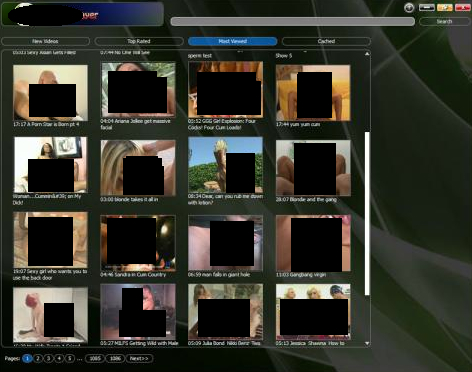The slump is especially stinging because technology — which helped adult-entertainment enterprises reap riches through innovations such as video streaming, webcameras and online payments — is contributing to the misery.
DVDs and online pay sites, which make up the majority of porn-related sales, are in a free fall largely because of the rise of so-called tube sites.
Knockoffs of video-sharing site YouTube, the sites serve up snippets of free porn that is often pirated. (Google’s YouTube has done its best to bar explicit content.)
Some 1,000 tube sites — double those of a year ago — have put a sizable dent in the estimated $13 billion porn industry, prompting a flurry of copyright-infringement lawsuits. Most tube sites run ads to make money.
“We’re dealing with the perfect storm: declining DVD sales, rampant piracy, free content and a weak economy,” says Steven Hirsch, founder of porn heavyweight Vivid Entertainment. He says its DVD sales plunged 20% last year. “This is the worst I’ve seen in this industry in 25 years.”
The wide range of free content available — be it pirated video content or amateur-shot footage — will “continue to have a negative impact on premium providers’ ability to attract and retain paying customers,” says a recent report by market researcher XBIZ. It says initial orders of DVD titles by distributors have sunk, on average, to 1,500 to 2,000 now, vs. 5,000 to 6,000 in 2005.
Vivid fires off more than several hundred takedown notices a month to sites that illegally show its content.
Last month, Ventura Content, which owns Pink Visual studio, filed a copyright-infringement lawsuit against Mansef, which operates some of the top-visited tube sites, for more than $6.5 million in damages.
At least eight of the 100 top sites in the U.S. are adult-entertainment sites, according to Internet traffic-ranking service Alexa.com.
Muddying matters, the “safe harbor” provision of the Digital Millennium Copyright Act puts the onus on content providers to legally protect their content when it is filched by smaller sites, industry experts says.
Vivid’s Hirsch likens the exercise to a digital version of Whac-A-Mole. His company must troll the Internet, looking for offenders. It issues a letter, asking the offending site to take down its content within the law’s 72-hour deadline. But the pirated content often is resurrected on someone else’s site after being taken down.
“The tubes are making money off the studios’ investment of time and money, while the studios are forced to spend ever larger chunks of change to police the tubes and send endless takedown notices,” says Kathee Brewer, an editor at AVN, which covers the adult-entertainment industry.
